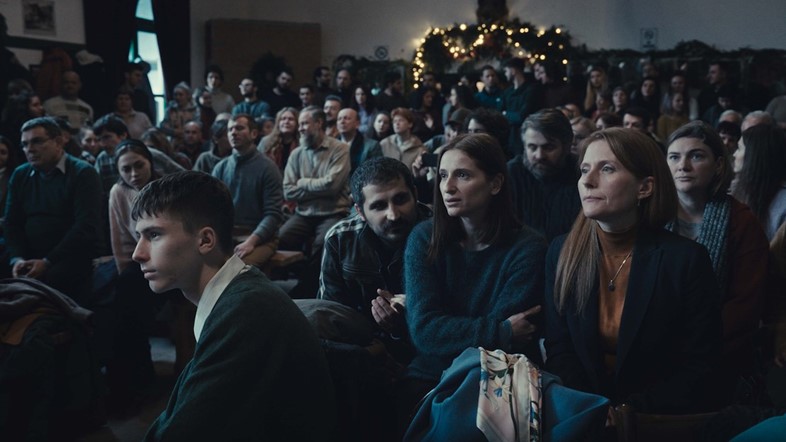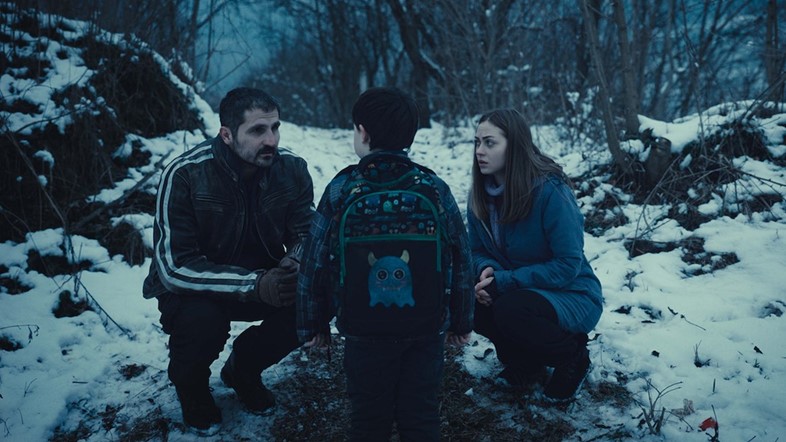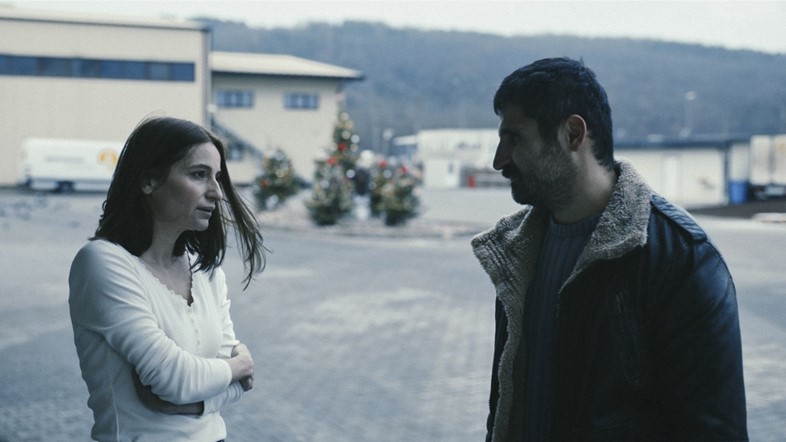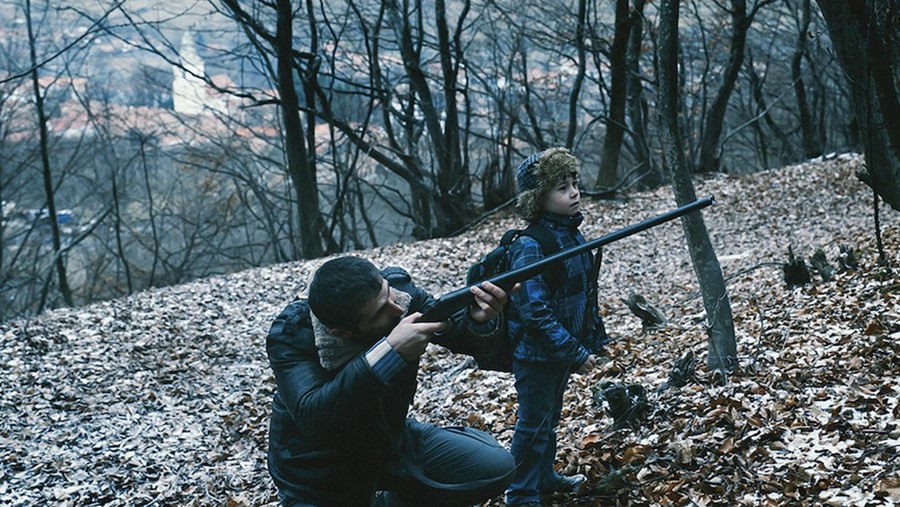Romanian New Wave legend Cristian Mungiu talks about R.M.N., his Palme d’Or-winning migration drama
Cristian Mungiu knows how he wants to shoot his films. Most famously with the 2007 Palme d’Or winner 4 Months, 3 Weeks and 2 Days, the 55-year-old Romanian director has established a favoured technique: his scenes unfold in a single shot, meaning that there are no cuts, just sustained tension. In his latest feature, R.M.N., the aesthetic is pushed even further with one take lasting 17 minutes. “The style is pretty much the same because I couldn’t come up with a better one,” says Mungiu. “I try to respect the integrity of time.”
What Mungiu refers to as the key change for R.M.N. is a “double point of view”. Rather than following a single protagonist, the patient yet explosive drama shifts between Csilla (Judith State) and Matthias (Marin Grigore). After losing his slaughterhouse job in Germany, Matthias returns to Transylvania in search of work, as well as to hook up with his ex, Csilla, who runs the local bakery. (Yes, one’s a bread-worker, the other wishes to be a breadwinner.) Both are caught up in a furore when Csilla employs two Sri Lankan workers, a decision that sparks racist outbursts and violent threats from the town’s Hungarian community.
A key figure of the Romanian New Wave, Mungiu started out in journalism and subsequently maintained a political streak throughout his films. In 4 Months, 3 Weeks and 2 Days, two women face a gauntlet of misery in pursuit of an illegal abortion; in Beyond the Hills, it’s the Romanian Orthodox Church that comes under scrutiny. For R.M.N., Mungiu based the script on an incident from 2020 in the Romanian village of Ditrău. “I met the real people,” he says. “I read comments on forums. The amount of hatred you discover on the internet is unbelievable – and it goes both ways. There’s a lot of solidarity for the foreign workers, but the moment people say, ‘Let the Sri Lankans work here, you filthy Hungarians’ – there’s no difference.”
Named after the Romanian wording for an MRI brain scan, R.M.N. is bleak and gripping, depicting how xenophobes can dominate the conversation when they use their voices and literal weapons. However, the director refers to the plot as “a first layer for people who are used to fast cinema”, and points out that, for instance, the shots of the vast forest represent the subconscious. The bears and sheep are also more than decoration. “The film is mostly about our fight with the animal inside. It’s more abstract and metaphorical. How do we talk about the fear, generosity, and anxiety we all have? Every situation with animals has a meaning in the film.”
In Mungiu’s Graduation, tension is drawn from the constant threat of a brick thrown through a window. In R.M.N., Csilla and her Sri Lankan employees are similarly attacked with launched objects when they’re at home, resulting in broken glass on the floor and ongoing paranoia. “Cinema allows you to experience what the character feels,” says Mungiu. “Matthias, especially, has anxiety. He’s not coping with the changes in his life or the world.”

While Csilla vows to stand up against racists who plan to boycott her bakery, Matthias doesn’t vocally take sides. You suspect that, deep down, Matthias is hiding his true feelings in order to rekindle his romance with Csilla. “Matthias feels something that all people living in these small traditional communities feel, which is that globalisation changed the world in a very profound way, and the consequences are difficult to foresee,” says Mungiu. “They don’t understand why they could live with their own rules in a small, isolated community, and then suddenly it’s possible for people to come over there, and the regulations are changed.”
The director continues, “Someone who’s not prepared to understand how the world has changed is not necessarily guilty. They’re guilty for not being educated enough. But you have to explain why things are happening. If you just tell them what they say is politically incorrect and to stop saying it – this won’t change what they believe.”
Such a complex subject therefore requires complex mise-en-scène. In a town hall, a debate unfolds between 26 speakers, most of whom spout racist beliefs, all in an unbroken 17-minute shot, the camera remaining still the entire time. As frightening as it is, a similar event happened in 2020 for real and was captured on YouTube.
“That long scene expresses opinions that are widespread amongst people living in traditional communities,” Mungiu explains. “Everybody knows it from private conversations, but nobody speaks about it openly. It’s important to be aware that this opinion exists and is widespread. It’s the main engine exploited by right-wing movements who don’t have any interest in explaining the situation; they just take advantage of the fear and anxiety, and exploit it for their own benefit.

“The solution is not to avoid speaking about this. This is why, sometimes, I think it’s good to shake people by quoting very politically incorrect opinions, because this might bring the subject forward. These people are as convinced that the truth belongs to them as the progressives. The scene also analyses how one loses their individuality for the comfort of becoming a little sheep in this mob. Actually, society’s progress is based on the people who are willing to defend their opinion against everybody else.”
Next up for Mungiu is Radio News, a decades-spanning book based on his grandmother’s life. He might adapt it into a TV series, not a feature. “Now I want to write books more than screenplays,” he says. “We all know that cinema, if it’s not fully dead, is dying. People won’t watch films in theatres on a big scale.” The director laments that, these days, audiences lack patience, and subsequently more “meaningful” projects are affected. “There always need to be a special something. You can’t make a film anymore and expect people to come because you did films before.”
I point out that at Cannes, R.M.N. generated acclaim for its 17-minute scene, the hyperbolic tweets making it sound like the director of Occident suddenly turned into Brian De Palma. I add that, ironically, the sequence captures the thrill of watching an unbroken YouTube video. “I got a comment from someone that the 17-minute shot was enough as a film and I shouldn’t have done the rest,” he says, laughing. “For younger people, this would still be a long YouTube video, but it’s more interesting for them than a two-hour film.”

Mungiu is so proud of the scene, he describes how it can be rewatched by focusing on a different face in the crowd, even if they’re not speaking. “Delivering what people think, but isn’t said, is interesting to me.” Moreover, Csilla’s argument falters as the scene unfolds, to the extent that she suggests, as a compromise, the Sri Lankan employees can wear gloves to handle the dough. It’s a reminder that, ultimately, Csilla is hiring low-paid workers to attain an EU grant.
“Csilla passes as someone who seems reasonable, but it’s in her interest to have the workers there,” says Mungiu. “Her position is ambiguous. It’s important, when we make a film, to not have any ideological demonstration, but to have a story that’s strange, and you remember that the characters are always human, and they make decisions that aren’t always fully coherent. Because if those decisions are coherent, they belong to you as a filmmaker, and not to them as characters.”
R.M.N. is out in UK cinemas now.
